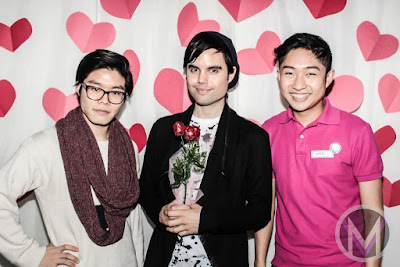 |
| Tweets via The Q Austin (TX) / M Factor (TX) / Mpowerment (national) and U-BE (TX) |
2) There is already an established Mpowerment (MP) twitter presence to support you. There are approximately 40 active Mpowerment Projects using twitter. Connect with other social-media-savvy-coordinators. First step? Follow and retweet us at @mpcaps. You'll soon be 'included in the MP twitter family. Check out our list of twitter projects.
3) Stay up-to-date and informed. HIV prevention information about the latest HIV biomedical and behavioral sciences are regularly tweeted out. There is no better newsfeed than twitter. We regularly check in on these favorite public health advocates:
@UCSFCAPS, @AHP_SF, @CDCNPIN, @YGBLI, @BlackAIDS, @HIVEqual, @RectalMicro, @NMACCommunity, @Out2Enroll, @talkHIV, @PozMagazine, @c4tips, @caliPTC, @Project_Inform, @NASTAD, @TheTaskForce
It doesn't take a lot of time. This is not about adding one more responsibility to your social media publicity strategy. The secret is: no one minds if you don't post for awhile. We suggest that you use your twitter account strategically; like participating in monthly twitter-chats and/or to participate in conversations at national and international HIV prevention conferences. Of course, if you are able to add twitter to a sustained social- media-publicity-strategy, DO IT.
 |
| Top Mpowerment Tweeters (by followers) 2015 |
Where do I begin? Beginner Twitter pro-tips:
- Read up on twitter first: CDC NPIN in the know: Twitter for Public Health. Webcast 2013.
- Be sure to practice on twitter a little bit every day. Start small. Begin by like and Re-Tweet (RT) others.
- Use the hashtag #Mpowerment on both your twitter and Facebook posts.
- Follow and learn from other Mpowerment Projects pick out your favorite posts.
- Keep tweets short. Tweets around 100 characters get the most replies and RTs.
- Tweet photos of your participants and Social Outreach Events. Visual content always receive more engagement.
- Tweet your advocates, like @mpcaps, other MPs, your host agency and funder. They love you. We love you. Reach out and say 'hi' or ask about something they've tweeted earlier in the week. Keep your advocates happy.
- Be your happy gay self and experiment. It's okay to be fun on twitter. We encourage projects to be gay-affirming and sex positive, per our Guiding Principles.
- Begin managing your social media by using tweetdeck or hoot suite. Using tweet deck you can schedule tweets for the week ahead.
- How the Q Austin uses twitter. The Q Austin on twitter.
Module 10: Publicizing the Mpowerment Project. Objectives:
To explain how to develop and implement a publicity plan that effectively reaches young adult Gay and Bisexual men and promotes the Project and its activities.
For the Mpowerment Project to be truly a community wide HIV prevention program, as many young gay/bisexual men as possible must learn about the Project and its activities. Thus, effective publicity is an important Core Element to help the Project achieve its mission of increasing condom use and HIV testing among young gay/bisexual men in the community. The most effective publicity campaigns:
1) use multiple strategies
2) have clear goals
3) reach all segments of the target audience
4) are timely and ongoing, and
5) place a Publicity Coordinator or volunteer(s) in charge of implementation.
In order to publicize the Project successfully, it is important to select the most appropriate messages to send out and decide how best to convey them. We encourage being as creative and thorough as possible in publicizing the Project. The best suggestions will likely come from the Core Group and other volunteers who are most familiar with their own community.
2) have clear goals
3) reach all segments of the target audience
4) are timely and ongoing, and
5) place a Publicity Coordinator or volunteer(s) in charge of implementation.
In order to publicize the Project successfully, it is important to select the most appropriate messages to send out and decide how best to convey them. We encourage being as creative and thorough as possible in publicizing the Project. The best suggestions will likely come from the Core Group and other volunteers who are most familiar with their own community.











